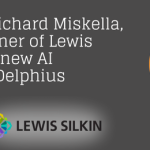Having gone out to the market at the end of 2020 to seek views on the use of smart contracts, The Law Commission has today (25 November) confirmed that the existing law of England and Wales is able to accommodate and apply to smart legal contracts, without the need for statutory law reform.
Smart contracts self-execute upon predetermined events and typically run on a decentralised network such as a blockchain.
The Commission has been deliberating on the matter since its call for evidence closed on 31 March 2021. It received 47 responses from stakeholders, including individuals and academics. The purpose of the exercise was to analyse the current law as it applies to smart legal contracts, including highlighting any uncertainties or gaps, and identifying work that may be required now or in the future.
The report today builds on a legal statement from the UK Jurisdiction Taskforce, which in November 2019 concluded that, in principle, smart contracts are capable of giving rise to binding legal obligations. It was after that statement that the Ministry of Justice asked the Law Commission to undertake the scoping study that it published today.
Professor Sarah Green, the Law Commissioner for the Commercial and Common Law Team, said:“Smart legal contracts could revolutionise the way we do business, particularly by increasing efficiency and transparency in transactions.
“We have concluded that the current legal framework is clearly able to facilitate and support the use of smart legal contracts; an important step in ensuring increased recognition and facilitation of these agreements.
“Our related work on digital assets and conflict of laws will further establish England and Wales as a global leader for technological innovations in the digital sphere.”
Lord (David) Wolfson of Tredegar QC, Parliamentary Under-Secretary of State, Ministry of Justice, said: “I would like to thank the Law Commission for this important paper analysing the current law as it applies to smart legal contracts. We in Government are excited about the transformative potential of emerging technologies, including smart legal contracts. We want a world-leading legal services sector, and that means ensuring English law can accommodate the technologies of the future. The Law Commission’s findings provide that all-important legal certainty for those seeking to use smart legal contracts. I also want to thank the Commission for their update paper on digital assets, as well as to highlight their new project on conflict of laws – both are essential to ensure English Law supports emerging technologies”.
Speaking from the industry itself, Aaron Powers, co-founder and CEO of smart legal contract firm Hunit, told Legal IT Insider over email: “This landmark guidance of the Law Commission is hugely welcome. It provides clarity around smart legal contracts compatibility with the current legal framework and can give legal professionals and firms the confidence needed to meaningfully explore their full potential. We believe smart legal contracts represent a real opportunity for the profession to add meaningful value to their clients while maintaining robust mechanisms that can protect contracting parties.”
While the Commission’s report paves the way for people to rely on smart contracts, the Law Commission notes that further work is required when it comes to conflicts of laws. The Commission’s analysis highlights, in particular, the difficulties inherent in applying existing conflict of law rules to smart legal contracts and associated technologies, including distributed ledger technology, which can give rise to multiple connecting factors across various jurisdictions.
“The problem of digital location – that is, the difficulty of ascribing real-world locations to digital actions and digital objects – is amongst the most significant challenges that private international law will have to overcome in relation to emerging technology, including smart legal contracts,” a statement from the Commission says.
You can download the report in full here: https://www.lawcom.gov.uk/project/smart-contracts/











